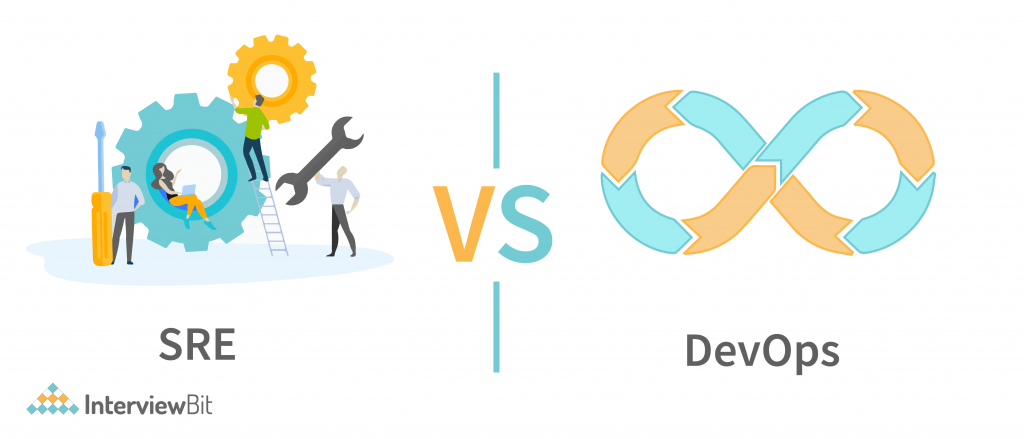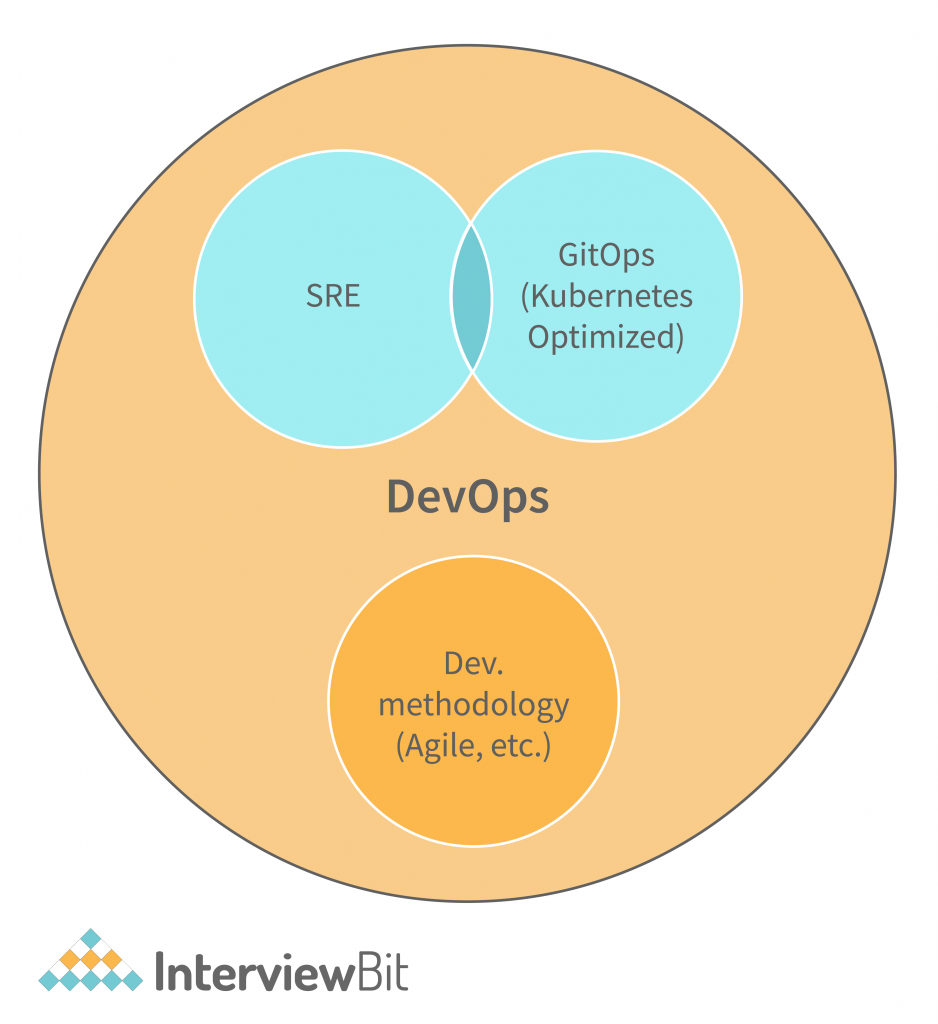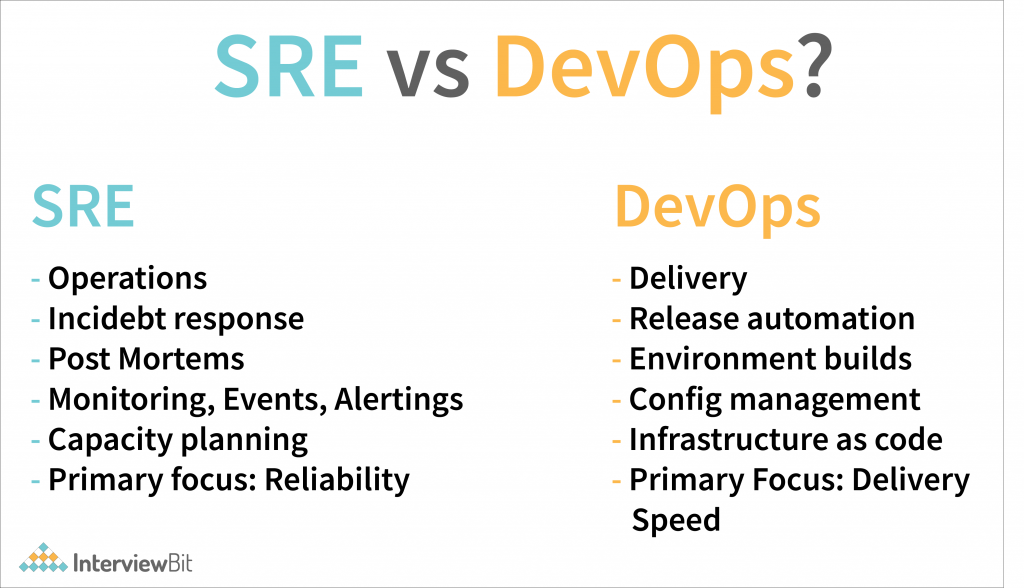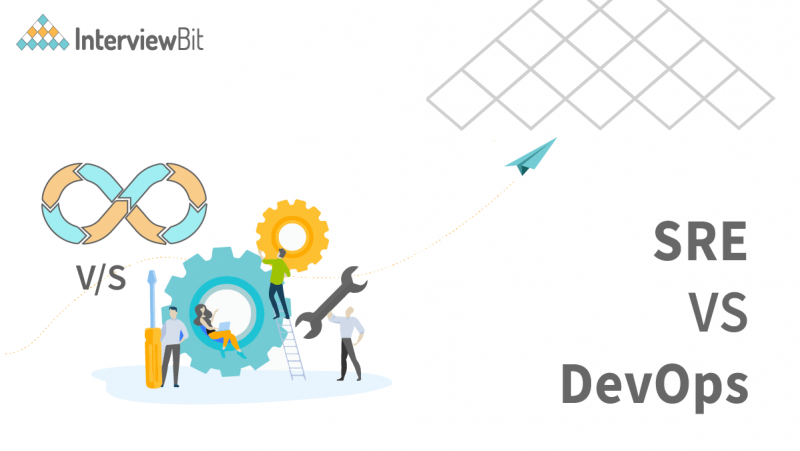In this day and age, when everything is digital and digital means business, it’s no wonder that the DevOps movement has become so popular. If you look closely, it’s easy to see why. It’s a great way to modernize your IT department and make it more agile and effective. It also aligns with other Lean thinking practices such as Continuous Integration and Delivery (CI/CD).
SRE stands for Site Reliability Engineering. It doesn’t have anything to do with software reliability or reliability engineering, but rather software assurance or assurance-based development. The two are very different concepts, but many organizations still don’t get what the difference is between SRE and DevOps. Both of these practices will help your team deliver high-quality code more effectively while decreasing the time needed to test it. Read on to learn more about the differences between SRE and DevOps so you can know which one is right for you!

What is SRE?
SRE is a methodology for improving the reliability of software systems. SRE involves identifying and addressing problems in the software system, developing solutions that address those problems, and continuously testing the system to ensure that it remains reliable. SRE is based on the principles of reliability engineering, which are the same principles that drive reliability engineering in hardware systems. The goal of SRE is to reduce the probability of failure by identifying and addressing problems early in the development process. SRE also focuses on continuous testing, which ensures that the system remains reliable even when it is not being used.
Confused about your next job?
SRE is a key component of agile development, which encourages developers to constantly test and iterate on their software. By identifying and addressing problems early in the development process, SRE ensures that the system remains reliable even when it is not being used. Kubernetes is to make it easier for developers to build and deploy applications that run on serverless infrastructure. In order to achieve this goal, Kubernetes consists of several components including a container runtime, a management tool, and a set of container orchestration APIs. Kubernetes is designed to be used in conjunction with other technologies such as containers, database servers, and application servers. The main goal of Kubernetes is to make it easier for developers to build and deploy applications that run on serverless infrastructure.

Benefits of SRE
Site reliability engineering is a process that involves the analysis of a site’s infrastructure, processes, and operations to determine the most effective way to ensure the site’s availability and safety. It is one of the most important aspects of any IT infrastructure, as it helps to ensure that the site is always available and that the correct data is being stored and processed. By identifying and fixing issues early on, site reliability engineering can help to minimize downtime and ensure that the site remains secure.
The benefits of site reliability engineering include:
- Reducing downtime: Site reliability engineering can help to minimize downtime by identifying issues early on so that they can be fixed before they become a problem.
- Reducing risk: Site reliability engineering can help to reduce risk by identifying issues early on so that they can be fixed before they become a problem.
- Improving performance: Site reliability engineering can help to improve performance by identifying issues early on so that they can be fixed before they become a problem.
- Improving security: Site reliability engineering can help to improve security by identifying issues early on so that they can be fixed before they become a problem.
What Does SRE Do?
Site reliability engineers are responsible for the overall health of a site. They are tasked with ensuring that the site is able to operate at all times, with minimal downtime. Site reliability engineers are responsible for the maintenance, and repair of equipment, as well as the overall health of the site. Site reliability engineers are also responsible for identifying and addressing any issues that may arise. They are also responsible for creating and implementing policies and procedures that will ensure that the site is able to operate at its best. Site reliability engineers are also responsible for ensuring that the site is able to meet its contractual obligations. In addition, site reliability engineers are also responsible for ensuring that the site is able to meet regulatory requirements.
- SRE helps develop the context for operations to support systems in production. Therefore, operations and development work together for a single system. SRE is focused on the delivery of services, not on creating a single source of truth. The focus of SRE is on how to create a services-first architecture that leverages the strengths of both development and operations.
- The team also conducts regular surveys to collect feedback. This allows engineers to identify problems and fix them. It also allows executives to see how well the team is doing by tracking the number of issues it has resolved.
- The team also maintains and maintains compatibility with the latest software versions. They work closely with the QA team to test new software versions against the production environment to ensure that they are as bug-free as possible. The SRE team also develops documentation and provides training on the new tools and techniques being introduced.
What is DevOps?
DevOps is a software development methodology that focuses on automating the deployment, configuration, and maintenance of software. DevOps involves adopting a software development approach that emphasizes rapid iteration, iterative deployment, and continuous integration. DevOps is a key component of open-source software development because it enables developers to quickly adapt their code to meet changing requirements. DevOps also helps to reduce the risk of software bugs and helps to ensure that software is delivered on time and within budget. DevOps is an approach that has been gaining popularity in recent years as it has become a central part of the software development process. DevOps can be applied in a variety of contexts, including software development, operations, and IT infrastructure.
Benefits of DevOps
DevOps is a software development methodology that emphasizes collaboration and continuous delivery. DevOps is an approach that seeks to reduce costs, increase efficiency, and improve quality by automating tasks and reducing human error. DevOps is most commonly used in software development, but it can also be applied to other types of projects.
DevOps has several benefits that make it an attractive approach to software development:
- Reduce costs – By automating tasks, DevOps reduces the need for expensive resources such as developers and testers. This can save money in the long run, as it reduces the need for expensive training and infrastructure.
- Increase efficiency – By automating tasks, DevOps increases the efficiency of teams by reducing the amount of time spent on tasks that are not necessary. This can lead to increased productivity and reduced costs.
- Improve quality – By automating tasks, DevOps reduces the amount of time spent on tasks that are not necessary. This can lead to increased quality and reduced costs.
- Reduce human error – By automating tasks, DevOps reduces the amount of time spent on tasks that are not necessary. This can lead to reduced human error and increased efficiency.
DevOps is an approach that can be applied to any type of project. It can be used for large or small projects, and it can be used in any environment, including the office or the field. It is a flexible approach that can be used for any type of project, including software development, web development, and even medical.
What Does DevOps Do?
DevOps engineer is a role that is often misunderstood, and the term itself is often used in a way that doesn’t really capture what a DevOps engineer actually does. The role of a DevOps engineer is to take the existing software infrastructure and make it more efficient, more scalable, and more secure. This can be done by improving the way that software is developed, deployed, and maintained. The DevOps engineer can also help to improve the quality of software that is being developed by helping to ensure that the software being developed is as bug-free as possible. DevOps engineers are often tasked with taking existing software infrastructure and making it more efficient, more scalable, and more secure. They can do this by improving the way that software is developed, deployed, and maintained. They can also help to improve the quality of software that is being developed by ensuring that the software being developed is as bug-free as possible.
DevOps engineers are often tasked with taking existing software infrastructure and making it more efficient, more scalable, and more secure. They can do this by improving the way that software is developed, deployed, and maintained. They can also help to improve the quality of software that is being developed by ensuring that the software being developed is as bug-free as possible.
- System availability and reliability are enhanced through site reliability engineering, while the speed of development and delivery are enforced by DevOps.
- An SRE team includes site reliability engineers who have backgrounds in both operations and development. DevOps teams, on the other hand, contain a wide range of jobs, including QA specialists, developers, engineers, SREs, and many more.
SRE vs. DevOps: What’s the Difference?

| SRE | DevOps |
| Having multiple teams share product ownership is the best approach. | Remove barriers to communication between departments. |
| When we come to the end of a project, we should be sure to look at all of the mistakes we made, in order to make sure they don’t happen again and identify the costs of doing so into the budget. | To succeed, you must accept failure and fail fast. |
| Before releasing a major version, test small versions carefully. | Gradually introduce new ideas. |
| Try to find automated procedures and try to use tools that can speed up operations and reduce manual labour. | Use tools and automation to improve productivity. |
| To track changes and monitor the health of systems, define and measure key performance indicators. | Everything must be measured in DevOps. |
| SRE is run from the top down, and it is operationally-driven, rather than technically-driven. | Development and operation are supposed to be aligned by DevOps. |
| SRE is more realistic. | More of a cultural and philosophical shift. |
| Developers are more involved in software monitoring and maintenance procedures. | Software monitoring and maintenance are managed by the operations team with DevOps engineers. |
| Developers can monitor and maintain software more efficiently than an administrator. | Software monitoring and maintenance are managed by the operations team with DevOps Engineers. |
| DevOps, SRE, and all other DevOps factors are merged into one entity to ensure a more precise recipe for success. | The term DevOps defines these aspects as breaking down boundaries between teams within the organization to encourage more efficient collaboration, better monitoring, and easier visibility. |
| In order to ensure the post-incident reviews are as thorough as possible, conduct them after the incident is over. You can document your findings and provide feedback to the development team by sending them a report. | The DevOps team works on reducing the issue by providing incident feedback. |
| The SRE team reports infrastructure problems to the Core development team and does not fix them if they are not affecting production. The SRE team handles infrastructure issues. | A DevOps engineer debugged code in the event of any bug being reported in the final product. |
| SREs seek to increase the reliability, scaling, durability, and robustness of applications. | Continuous Integration/Continuous Delivery should be emphasized over product development. |
| SREs perform mainly operational functions, for example, production failures, and infrastructure problems such as disks, memories, security, and monitoring. | The DevOps team primarily focuses on developing solutions to meet company demands, in order to ensure quality. |
| The goal of SRE is to create a set of methods and metrics that improve collaboration and service delivery. | The DevOps mindset encourages cultural thinking and collaboration across different departments. |
Key Differences Highlighted
- DevOps can do so by automating tasks such as creating build packs, monitoring application health, and provisioning/deploying software according to standards and best practices. Other tasks such as monitoring performance, compliance, and security are also automated. SRE teams work together with the goal of automating tasks and improving the overall functioning of the organization.
- Site Reliability Engineering is a process of finding and fixing any issues with software before it is released to the public. The idea is to minimize the risk of the software failing during its first use. In contrast, DevOps is a process of continuously improving the capabilities of an organization’s software development and operations teams. It is often used to predict when a new version of the software will be released, and how that version will be different from previous ones.
- DevOps enables business transformation by reducing costs, increasing efficiency, and creating new revenue streams. The value of the SRE role is not just in the delivery of software. SREs enable a culture of innovation and problem-solving by championing open-source technologies, standards, and best practices. They help organizations grow by removing the silos between development, operations, and marketing that have traditionally constrained their growth.
- DevOps teams usually write code, test it, and push it into production in order to deliver software that helps someone’s issue. CI/CD pipelines are set up and run by DevOps teams. They also perform Site Reliability Engineering. The SRE team’s analysis differs somewhat. They want to know why something went wrong in order to prevent it from happening again.
- SRE was designed to create a set of techniques and metrics that allow for better collaboration and service delivery in DevOps, whereas culture and solidarity among separated teams are the focus of DevOps.
- SRE, or DevOps, involves prescriptive methods of achieving quality, while DevOps, which guides collaboration, is a template that guides construction.
Conclusion
The SRE vs DevOps debate has been raging for years. In theory, SREs are the people who are responsible for keeping the software and infrastructure of a company running and healthy. On the other hand, DevOps is the term used to describe the process of developing and deploying software. In theory, DevOps is supposed to be more efficient and less prone to bugs than SREs. However, there are many reasons why DevOps is not necessarily better than SREs. For example, DevOps can be implemented in a more agile way than SREs. Moreover, DevOps can be implemented with a lot less money than SREs. In addition, DevOps can be implemented in a lot more environments than SREs. Finally, DevOps can be implemented within a lot less time than SREs. So, in the end, it all comes down to your personal preferences. However, if you are looking for a more efficient way to develop software, then SREs are definitely the way to go.
FAQs
Ans: A culture of continuous improvement is one of the most important aspects of DevOps. SRE is another important aspect of DevOps. SRE, which is a set of practices and tools, is designed to make sure that all parts of an organization are working together to deliver high-quality software. By continuously improving the quality and efficiency of software development, organizations can reduce their costs and improve customer satisfaction. DevOps is closely tied to SRE because it is one of the most important aspects of software development.
Q.2: Does SRE require Coding?
Ans: A company’s culture of continuous delivery may be created by SRE, a set of practices, tools, and processes. Coding is an important part of SRE, and it must be understood in order to understand its significance. SRE requires developers and other team members to be able to rapidly and easily test their code and make changes to it. In addition to coding, one of the most time-consuming activities in the software development process is testing. By following SRE rules, organizations can cut down the time that they spend on coding, which will allow them to deliver high-quality software faster.
Q.3: Which pays more for DevOps or SRE?
Ans: SREs earn more than DevOps because they have more knowledge and responsibilities to share. They also have the advantage of being promoted faster, which means that they will receive a raise. SREs also earn more because they have more time to dedicate to their jobs. They may also use more resources and tools to help them.
Q.4: What is the future of SRE?
Ans: The demand for SRE positions in technology will increase as technology continues to invade our day-to-day lives. These engineers are vital to the maintenance and proper functioning of all development and operational procedures.







 Join WhatsApp Group
Join WhatsApp Group


